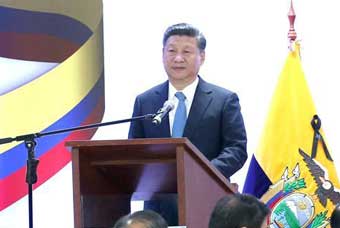WASHINGTON, Jan. 3 (Xinhua) -- U.S. House Republicans on Tuesday dropped a proposal they passed overnight to shift the Office of Congressional Ethics, an independent non-partisan agency that polices potential ethical wrongdoing by lawmakers, to a position underneath the House ethics committee, just hours after President-elect Donald Trump slammed it for "weakening" the watchdog.
"House Republicans made the right move in eliminating this amendment that should never have seen the light of day," said David Donnelly, president and CEO of Every Voice watchdog group on Tuesday. "Not one voter went to the polls in November hoping Congress would gut ethics oversight."
"After eight years of operation, many members believe the Office of Congressional Ethics is in need of reform to protect due process and ensure it is operating according to its stated mission," House Speaker Paul Ryan defended the proposal in a statement earlier Tuesday.
His remarks came just before the withdrawal by House Republicans and soon after Trump criticized the proposal over his two tweets earlier on Tuesday.
"With all that Congress has to work on, do they really have to make the weakening of the Independent Ethics Watchdog, as unfair as it ... may be, their number one act and priority. Focus on tax reform, healthcare and so many other things of far greater importance!" Trump tweeted.
He added "#DTS" at the end of his tweet, short for "Drain the Swamp," the anti-corruption slogan from Trump's campaign.
Republicans in the House of Representatives voted Monday night for the ethics watchdog's position shift. The new mandate for the office, if approved by the full Congress, would restrict it from making public statements, allow the House to halt investigations and stop anonymous reporting.
Currently, investigators with the watchdog have the freedom to pursue allegations against lawmakers and make recommendations to the House Ethics Committee about whether or not to open a formal probe. The committee can then decide whether a lawmaker is innocent or deserves some sort of punishment.
The ethics office was created as an independent, non-partisan entity by Congress in 2008 under then-Speaker Nancy Pelosi, the current House Minority Leader.
The two-year 115th U.S. Congress was sworn in on Tuesday. Once Trump takes oaths on Jan. 20, Republicans who have a 52-48 advantage in the Senate and a hefty 241-194 majority in the House, will hold the White House and both chambers of Congress for the first time since early 2007.
However, since most legislation needs 60 votes in the Senate, the Republican lawmakers still have to garner bipartisan support to fulfil their major policy tasks such as reforming the immigration system, passing spending bills, raising the federal borrowing limit as well as repealing and replacing the whole package of Obamacare.










